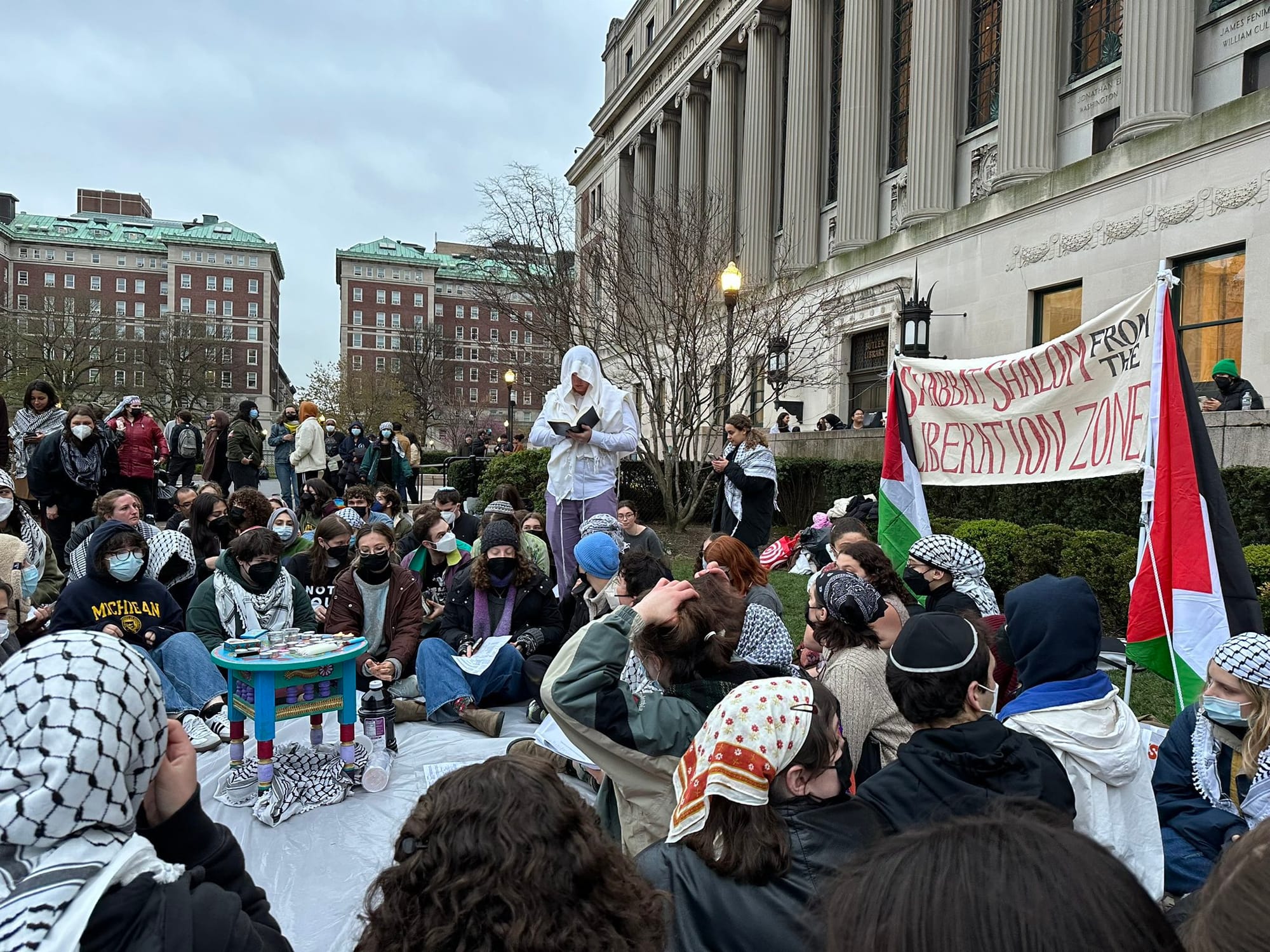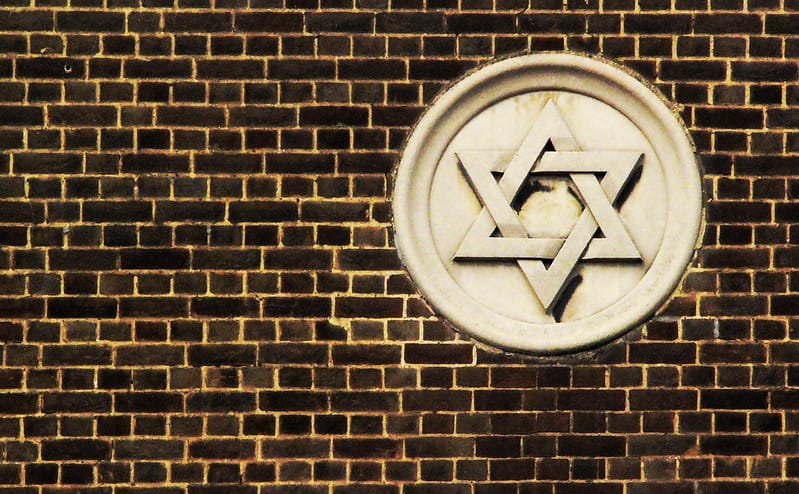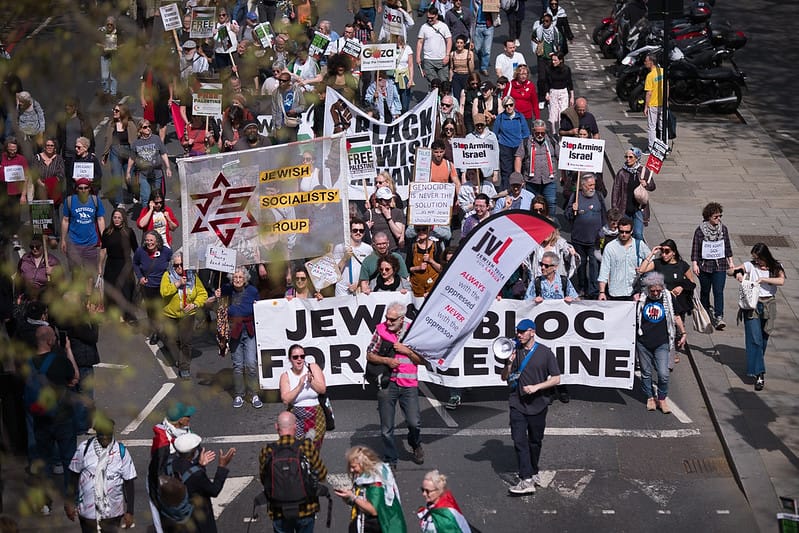How to fight antisemitism – and win
Instead of relying on police, provosts and prime ministers, it’s time we mobilised cross-community movements to uproot antisemitism at its foundations.

It would be fair to assume that as Jewish writers who have spent much of our careers actively highlighting the growing danger of antisemitism, we would be delighted that it is currently one of the biggest news stories around the world. But despite the mountains of headlines, Anti-Defamation League data audits, pending anti-free speech legislation and an all-out street war on college activists, what does not seem to be on offer is a grounded conversation about what antisemitism actually is and what we can do about it.
Instead, accusations of antisemitism are lobbed by the right as a Hail Mary pass against progressives; the issue is injected into conversations that have little to do with the historic ideology that has plagued Jews for centuries; and we are still failing to address the rapid mainstreaming of antisemitism across the authoritarian right, as it continues to advance its anti-democratic agenda. We want a fight against antisemitism – just not the fight we’ve been handed.
Instead of replaying the technocratic games of power that have misled us to outsource the fight against antisemitism to police, prisons, provosts, presidents and prime ministers, it is time we mobilised cross-community movements to uproot antisemitism at its foundations. Informed by the lessons we lay out in our new book, Safety Through Solidarity: A Radical Guide to Fighting Antisemitism, here is our 10-point guide to tackling this form of oppression at its source.
Step One: Fight for a more equal society
We cannot ultimately defeat antisemitism without a revolution. Antisemitism thrives within the economic and social system of racial capitalism, where wealth, power and privilege accrue to a select few, leaving most people exploited and disempowered. Under this unjust system, authoritarian leaders spread conspiracy theories that an all-powerful Jewish cabal is responsible for society’s oppressive hierarchies: a false narrative that protects those who benefit from these hierarchies by confusing and dividing everyone else, misdirecting popular rage away from the root causes of oppression.
As long as masses of people are suffering, alienated and eager to find someone to blame, antisemitism will remain a powerful meta-explanation for reactionary leaders to draw upon to divert popular anger onto a false target. Only by creating a more just and equal society, where people are empowered to lead lives of true meaning, can we undercut the alienation that motivates people to look for scapegoats.
While that may feel like a distant goal, however, there is plenty we can do in the short and medium term to help us get there.
Step Two: Resist the authoritarian right
We must build the broadest possible social movement to defeat the resurgent, white Christian nationalist right – an exclusionary, authoritarian movement that is the primary ideology driving antisemitism and all other forms of oppression in today’s world.
In the short and medium term, blocking the advance of the authoritarian right means defending and expanding multiracial democracy, imperfect and flawed as its institutions often are, while also building parallel institutions that embody and prefigure the better world we are building. It means growing the capacity to counter far-right mobilisations in the streets, the classrooms, the courtrooms, the synagogues and all other sites of contestation.
It also means developing practices of mutual aid and accountability to keep each other safe, and building our tactics and strategies on a deep foundation of care and solidarity. And it means making our movements for racial, economic and gender justice expansive enough to welcome as many people as possible from diverse constituencies, while remaining grounded in core principles.
Step Three: Build multiracial coalitions
To defeat the authoritarian right, we must build strong coalitions of partnership between different identities and communities targeted by a shared threat. Anti-Blackness, transphobia, anti-migrant xenophobia and other forms of oppression have largely the same source as antisemitism: white Christian supremacy, capitalism, colonialism and male supremacy.
Our coalitions have to use intersectional analysis, understanding how different forms of oppression interlock, uphold and mutually reinforce each other, to get at the root of it all, together. We must build resilient, radical cultures and communities, founded on durable relationships that can resist the right’s attempts to divide us along lines of difference.
Step Four: Understand our differences
This means we have to actively respect the right to difference in our communities and relationships. We can trace commonalities and intersections between different forms of oppression, but this does not mean that these kinds of oppression manifest in the same way, or that the experiences of those targeted by different forms of oppression are identical.
Antisemitism may have a common source as other forms of marginalisation, but it does not work in exactly the same way. The tools we use to understand its history and present-day manifestations, and the strategies we use to combat it, may be familiar in some ways and distinct in others. Within and between communities, we must remain attentive to the specific experiences of different individuals and groups, and learn and grow from these differences rather than trying to subsume them into a higher sameness.
This also means that Jews and all other marginalised groups deserve to have their uniqueness and particularities protected within a pluralistic society. Jews can resist assimilation by reclaiming bold, proud Jewish identities, while non-Jews can support us by holding space for our self-organisation, and bearing witness to our histories, identities and trauma.
Antisemitism is an attack on the Jewish right to remain Jewish, to hold Jewish particularism, ritual, tradition and community across the centuries, and just as all targeted groups have the right to reclaim their ancestral legacies, Jewish resistance to antisemitism must recognise Jewish distinctiveness. This means fostering the full flourishing of Jewish identities and experience, and protecting the rights of all Jewish communities to fully practise their embodied traditions.
Step Five: Combat conspiracism
We must create a united front against conspiracy theories, which are largely built on an antisemitic framework. They are foundational to the false narratives of the ascendant far right, and on the left they undermine any viable fight for real change by keeping us confused about the root causes of oppression, chasing imaginary cabals instead of transforming concrete systems of power.
We can fight conspiracy theories with in-depth political education in social movement spaces, tracing the real actors and structures that stand in the way of change. We can also work to combat misinformation in broader society through measures like increasing media literacy, holding social and mainstream media outlets accountable, and implementing journalistic practices that combat blatant falsehoods and fearmongering.
Without a fundamental transformation of systemic inequities in our society, however, these will be half-measures at best. Conspiracy theories thrive in a world where people feel alienated, isolated, disempowered and eager for someone to blame. Only by building a world where people are meaningfully empowered to shape the conditions of their lives can we combat conspiracy thinking at its root.
Step Six: Avoid hyperbole
We must avoid hyperbole when discussing antisemitism, rejecting any notion that it is an “eternal hatred” irredeemably plaguing our society or a “natural” component of the gentile world, or that any rise in antisemitism means another Holocaust is right around the corner. Rather, antisemitism can be understood, unlearned and defeated, like any other form of oppression.
We can do this by understanding it in its historical, social and political context, and engaging in mass movement building. We can also work to understand and heal from the inherited, intergenerational trauma in Jewish communities that helps these fear-based narratives stick. And we can resist the various actors within and beyond our community that foment and amplify fear in order to mobilize support for their reactionary and divisive agendas, such as pro-Israel groups in the diaspora and right-wing Israeli or Christian nationalist leaders.
Step Seven: Stop weaponising antisemitism against Palestinian liberation
We need to scale up the global uprising in support of Palestinian rights and an end to settler colonialism in Palestine (and everywhere else), and immediately halt politicised accusations of antisemitism that are too often wielded by the right as a cudgel against progressive movements. These smokescreen accusations have become a primary tool used by the right to demonise and delegitimise one of the largest mass solidarity movements in recent history, and many institutional forces are using these accusations to pass repressive legislation, target activists, and shred the rights of free speech and political activity that have historically kept Jews and other minorities safe.
Most of those wielding such accusations aren’t really trying to keep Jews safe. Israel’s defenders are trying instead to distract from the growing awareness of Israel’s oppression of Palestinians, while white Christian nationalists are trying to divert attention from rising antisemitism on the right by cynically portraying themselves as the best friends of Jews.
We must clarify the difference between antisemitism and principled criticism of Israel’s deepening oppression of Palestinians, and emphatically affirm that the right, not the left, is the primary source of antisemitism and the biggest threat to Jews today. We must also learn to distinguish between feeling unsafe and being unsafe, and between discomfort and danger, so that we are less susceptible to right-wing fearmongering campaigns that don’t have our best interests at heart.
Alongside this, we need to recognize that militarist, ethnocratic politics in Israel have done little to keep global Jewry safe. Instead, they have created a status quo of radical instability and danger in the Holy Land, and put large parts of the Jewish community into a toxic alliance with the antisemitic global far right – all while waging war on the indigenous inhabitants of historic Palestine.
Step Eight: Recognise antisemitism in our movements
While more deeply ingrained in the political right, antisemitism can show up on the left as well, just like any other form of oppression in our society. Because antisemitism presents itself as a way to “speak truth to power”, it can appeal to social movements or marginalised communities looking to understand and counter systems of unjust power – leading these movements and communities down a dead-end road of conspiracism and scapegoating. But unlike the right, where antisemitism is a core driver of authoritarianism, antisemitism in movement spaces can be unlearned with commitment and dedication, just like other forms of oppression.
We can fight antisemitism on the left through fostering in-depth political education; avoiding conspiracy theories (whether around capitalism, Israel-Palestine or anything else); strengthening relationships of mutual trust, care and accountability between communities; and cultivating greater sensitivity to Jewish history, identity and trauma. We can fight for Jews to be fully included in the left’s circle of care through the stories the left tells about who is deemed worthy of solidarity and liberation. By vocalising its commitment to fighting antisemitism and including Jews in its “story of ‘we’”, the left can more fully embody its commitment to collective liberation across the board.
Step Nine: Uplift marginalised Jewish voices
We have to uplift the voices and leadership of Jews of colour, Sephardi and Mizrahi Jews, working-class Jews and marginalised Jews of other identities. Because marginalised Jews sit at multiple axes of identity, they are uniquely positioned to speak to the intersections of oppression that must be addressed when constructing any viable program to fight antisemitism, and to build relationships of solidarity across communities.
Black Jews, for example, can be especially well-positioned to unpack the intersections of antisemitism and anti-Blackness, and to help catalyse a politics of solidarity within and across these overlapping and distinct communities. Without this leadership, we are liable to replicate ineffective and harmful organising models that tend to separate antisemitism from other forms of oppression, foster complicity with racist state violence and other oppressive forces, and elevate dominant expressions of Jewishness over others.
Step Ten: Mobilise non-Jews in our shared struggle
Non-Jews must join the fight against antisemitism. Especially in progressive and radical movements, it is too often only Jews who show interest in understanding and fighting antisemitism – but antisemitism is first and foremost a problem of the gentile world.
We not only need non-Jews to support Jews who are threatened by rapidly deepening antisemitism, we need non-Jews to see it as their own fight. Antisemitism is a conspiracy theory that harms both Jews and other marginalised groups, and undermines our collective ability to fight for change; for that reason, it is in everyone’s interest to defeat it.
Ben Lorber is Senior Research Analyst at Political Research Associates, a social movement think tank, where he writes, trains and educates on fighting antisemitism and white nationalism and winning collective liberation.
Shane Burley is the author of several books on the far right and social movements, including No Pasaran: Antifascist Dispatches from a World in Crisis and Why We Fight: Essays on Fascism, Resistance, and Surviving the Apocalypse.
There’s no corporation or big advertisers behind Vashti. We're a workers' cooperative and rely on small donations to keep running. Support our journalism to help break the consensus.
To donate once, click here. To donate monthly, click here.
Authors
Sign up for The Pickle and New, From Vashti.
Stay up to date with Vashti.





